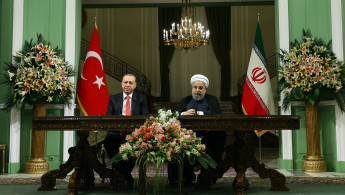Iraq-Iran-Turkey to respond to Kurdish referendum at Baghdad summit
The meeting will bring together Iran's President Hassan Rouhani, Turkey's leader Recep Tayyip Erdogan and Iraqi Prime Minister Haider Abadi, according to the leader of Iraq's ruling National Alliance movement Jasim Mohammad Jaafar.
"According to a previous plan, the Iraqi prime minister was expected to meet Erdogan and Rouhani in Tehran," Jaafar told The New Arab's sister Arabic-language newspaper, al-Araby al-Jadeed.
"But he missed it and requested that the summit be held in Baghdad, considering that it is a matter concerning Iraq."
He said the meeting will decide what action will be taken against the Kurdistan Regional Government [KRG] which called the controversial election "that will not harm the people of Iraqi Kurdistan".
An Iraqi foreign minister official confirmed to The New Arab that the Iraqi prime minister's schedule includes meetings with the Iranian and Turkish presidents.
He said this will be to discuss "several issues", but no time has yet been set.
"The prime minister will not travel to any of the two countries for protocol reasons," he said. "The fact of the matter is, this remains primarily an Iraqi crisis."
The expected tripartite meeting will also look into the status of the ethnically-divese, oil-rich city of Kirkuk and the presence of Turkish forces in northern Iraq.
"[It will also bring up the] question of handing over the task of managing the land and air passages in Kurdistan to Baghdad," he added.
Iraqi Kurds announced an overwhelming "yes" for independence last week following a referendum that has incensed Baghdad.
Iraq's government has taken a series of punitive measures since the vote, including a blockade on international flights to the region and prohibiting the sale of dollars to banks in Kurdistan.
On Thursday, Prime Minister Abadi said that he is not seeking an armed conflict with Iraqi-Kurds, but reiterated his staunch opposition to the autonomous Kurdistan region's independence referendum.
"We don't want armed confrontation, we don't want clashes but federal authority must prevail," he said after a meeting in Paris with French President Emmanuel Macron.
"Separatism is unacceptable," Abadi added.
He stated that the non-binding 25 September vote - which saw 93 percent of Iraqi-Kurds back independence - was "illegal".
"Iraq belongs to all Iraqis," he said, appealing to Kurdish Peshmerga forces to work with the Iraqi army "as we have worked together against Daesh (the Islamic State group), to guarantee citizens' safety".
Iraq's parliament has asked for harsh measures to be inacted in retaliation for the vote, including sending federal troops to the oil-rich city of Kirkuk.
Turkey and Iran - which both have their own Kurdish minorities - have denounced the referendum, while the United States described it as "unilateral" and lacking legitimacy.





 Follow the Middle East's top stories in English at The New Arab on Google News
Follow the Middle East's top stories in English at The New Arab on Google News


